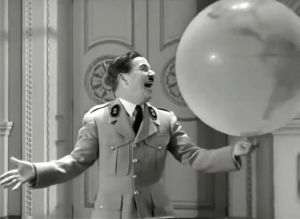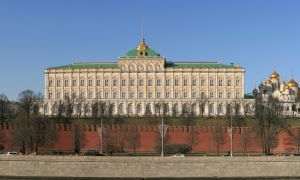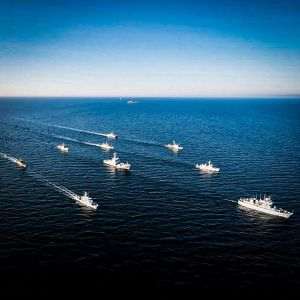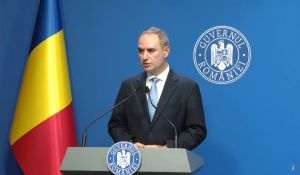On the brink of an enlargement that will redefine its fate, The European Union is feeling the burden of the past heavier than ever - that is, problems left unsolved before taking "the big step ahead.
On May 1st, a very large wave of new members will pour into a political and institutional space that is more fragile than ever before.
The foremost important matter that awaits a resolution is the very Constitution of The European Union. The changes brought about by the draft Constitution - changes that have been submitted to the member countries for consideration - are far from revolutionary. Most of the dilemmas generated by the structural inconsistencies of The E.U. have remained untouched - that is, awry. The gap between the ambitions of the united Europe project and the actual political capabilities of sustaining such ambitions has been a constant characteristic of The European Union ever since its earliest days. Wisely or resignedly, everyone chose to look at the bright half of the matter, that is, at the progress made from one stage to the next. This, perhaps, is what would have happened with the draft E.U. Constitution if the core of the matter had not been to extremely sensitive issue of "the power of decision.' This power is shared by two institutions: The Council and The Commission. The Council ensures the mechanism through which the governments of the member countries have direct control over all significant decisions concerning The E.U. The most important characteristic of the way in which power is shared within The Council is that the votes of the member countries are not equal, but proportional. This structural element - an element of institutional philosophy and organization - was also retained within The Treaty of Nice, the document that opened the path for eastward enlargement. Each new member was allocated - under The Treaty, an only after difficult negotiations - a certain voting power. For instance, Poland is, according to this allocation, a "middle-sized' power in The E.U., even if its level of economic development and therefore its contribution to the common budget will generate rather a deficit than a surplus. The very delicate political balance between "the great powers' (Germany, France, Britain), "the middle-sized powers' (Spain, Italy, Poland), "the small-sized members' (including Romania) and "the very small-sized members' (Malta, Cyprus, Latvia, Estonia) was simply blown up when the draft Constitution was elaborated. Without questioning the numbers that define the voting power, Germany advocated the introduction of a formula based on the idea that the arithmetic majority of the votes within The Council should account for 60 percent of the total population of the member countries. In other words, not just any combination resulting in a majority should be applicable! The introduction of a criterion of "oversizing' the vote according to population, is, of course, favorable to Germany (and Poland), but unfavorable to Spain, which will not accept a redefinition of the power balance within The Council. Theoretically speaking, this Gordian knot should be cut by the year-end. Chancellor Schroeder recently made a concession by giving in to France's pressures for a resumption of negotiations and suggested that Germany might accept a vote/population ratio of 55 percent. For the time being, Spain continues to firmly reject the idea of double representation (population / votes) within The Council.
The power equation is equally complicated as far as The Commission is concerned. Although European ministers are not politically or legally controlled by their governments - they answer only to The Council and The Parliament of The E.U. - they always represent the policies and interests of their countries when exercising their executive and legislative powers. This is why it was agreed that each member country should have a member on The Commission, both before and after enlargement. This decision leads not only to thick red tape involving 26 European ministers (commissioners), but also to a weakening of the power that France, Germany and Britain used to have at the time when they each had two representatives on The Commission. Germany and France have tried to compensate the loss: Germany wants to appoint a permanent "super commissioner' in charge of economic affairs, while France wants that The Presidency of The Council of Europe be a) long-term and b) rotating only among "the great powers.'
At least two problems are strongly shaking a construction that seemed solid enough to sustain an additional 10+2 members: The Stability and Growth Pact and The Common Foreign and Security Policy. Intended to be a set of harmonization measures and drastic restrictions regarding economic macro-stability, a foundation of the single European currency, The Stability and Growth Pact is facing the risk of collapse. For over two years, France and Germany have been reporting parameters below the requirements of The Pact, especially regarding the budget deficit. This situation was first pointed out, then discussed and eventually approached from a political standpoint. The solution that France and Germany suggested was to relativize The Pact. In other words "The Pact is applicable, but not now, or not necessarily to us!' Romano Prodi took a step back and seemed willing to embrace the "revisionist' views of the powers in distress. The other members, however, begged the different arguing they were making painful efforts to stay within the established parameters. Consequently, Spain's Pedro Solbes, the one in charge of this financial matter, moved for sanctions against the two countries and threatened to take the matter to The European Court, should "a political settlement' be attempted. This is only the beginning of legal and especially political complications, considering that the states due to join The E.U. in 2004 or 2007 are being imperatively asked to observe The Pact to the fullest extent, while two pillar members of The E.U. are seeking ways to elude it.
Finally, what should have been one of the greatest aspects about the enlarged European Union, a Common Foreign and Security Policy, seems to be farther and farther from the E.U.'s reach. Even Britain's Commissioner on External Relations Chris Patten made acid remarks about The Blair Government's unequivocal support of the U.S. stand on the Iraqi issue, an attitude that made it clear how far Britain really was from United Europe. As for developing an independent military force of The E.U., disagreements persist as to the proportion and nature of the missions that such force would be assigned to by "the autonomous planning cell' which would supposedly become the H.Q. of Europe's military arm. The road from decisions to facts is going to be long and hard, especially from a political perspective. London and Paris continue to have very sharp disagreements. At the same time, the French - German - British triangle is not solid enough to allow us to think that all these problems are going to be solved soon. Judging by all appearances, The E.U. is looking at a period of great economic and political difficulties ahead of it. Everyone agrees that, if The Constitution is not passed by the year-end, it will remain nothing that a page in history, the trigger of one of the most serious political crises in the history of Europe.
Final Warning From European Parliament
The European Parliament has passed The Country Report on Romania made by Baroness Emma Nicholson for The Foreign Affairs Committee by 374 pros, 10 cons and 29 abstentions. The E.P. has therefore warned The Romanian Government that it needs to fight high-level corruption, ensure the independence of the legal system, guarantee the independence of the mass media and put an end to police abuses. The recommendation to The European Commission to "reorient the accession strategy for Romania' was also adopted, but without changing the prospective accession date of January 2007. What "reorientation' signifies is that much increased attention will be paid to the observance by Romania of its political accession criteria: human rights, the rule of law and the community acquis - particularly the provisions regarding justice and home affairs. The European Parliament has asked The Commission to analyze the working conditions of Romanian journalists and has also asked The Romanian Government to punish those who have assaulted journalists.
Based on the amendments adopted by The European Parliament, The Commission is to present a new report on Romania on April 24th
Government Pleased With The Report
Although the European parliamentarians have passed the amendment warning The Romanian Government about endemic corruption and political interferences with the legal system, Premier Adrian Nastase believes that the message from Brussels is an encouragement. "Today's vote denies the pessimistic views some people in Romania have expressed and also reflects the well-balanced debate on the progress Romania has made so far," Premier Nastase said shortly after The European Parliament voted on The Report. He added that The European Parliament had modified the document submitted by The Foreign Affairs Committee by taking out the amendment criticizing The Romanian Government for deliberately misleading The European Commission. Adrian Nastase believes that the M.E.P.s' tone became milder after Romanian Government and Parliament dignitaries went to Brussels to advocate Romania's side, and especially after Nastase himself presented to E.U. officials a new list of commitments and priorities of The Romanian Government.
What the premier did not mention is that the M.E.P.s had passed an amendment that seriously questions the observance of political criteria for accession by Romania. The amendment includes the expression of concern that Romania's Political Parties Law prevents small/regional parties from being elected to Parliament. Nastase on the other hand pointed out that The Government had reacted promptly to Europe's message and had already debated the set of laws concerning international child adoptions. Moreover, Nastase promised that The Government would keep M.E.P.s informed, on a weekly basis, of the progress made in relation to sensitive issues.
The National Liberal Party (P.N.L.) has interpreted The European Parliament's message as an alarm signal about Romania's accession in 2007. "Accession is far from being a certainty," said P.N.L. deputy chairman Teodor Melescanu. He added: "The Nastase Government is responsible for this situation by having systematically lied to E.U. officials and by having cynically violated international agreements."
Democrat Party (P.D.) chairman Traian Basescu commented that the Report passed by The European Parliament was a no-confidence vote cast against The Nastase Government on a European scale. In his opinion, Romania is facing the risk of being separated from Bulgaria for "Bulgaria has four negotiation chapters to go, while we have eight left."
Jonathan Scheele, head of The European Commission Delegation to Romania said the vote had the significance of a cold shower, of a message he was sure The Government had understood. He added Europe was concerned about Romania's capacity to make the efforts necessary to accomplish the year 2007 accession objective.
Mark Percival, president of "Romania Think Tank" believes that the Report adopted by The European Parliament is the final warning for Romania. He believes The Government should take things more seriously and make real, not cosmetic reform. He added that, although the amendment made by The Foreign Affairs Committee on Romanian mass media debts to The State had been denied, it did not mean that The Government should not focus on solving this problem.























































